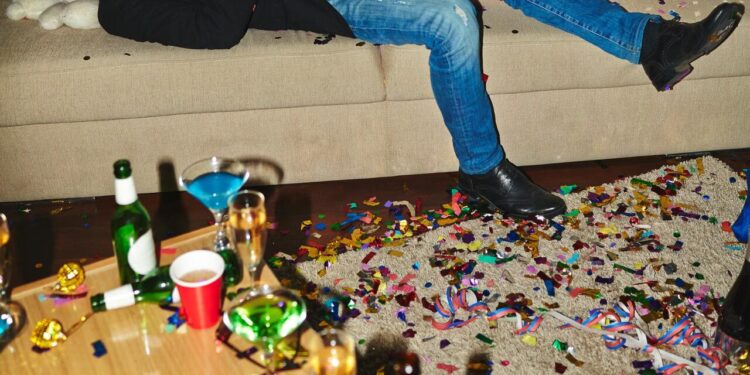After indulging in a night of revelry, the morning-after blues can hit hard. Beyond the throbbing headache, light sensitivity, and general malaise of a hangover, there’s often an added layer of unease— hangxiety. This term captures the anxiety and worry that can accompany post-drinking moments, leaving you questioning your actions and words from the night before.
The phenomenon of hangxiety is rooted in alcohol’s impact on neurotransmitters like gamma-aminobutyric acid (GABA) and glutamate. As alcohol levels drop in your system, GABA decreases, leading to heightened glutamate levels. This imbalance can contribute to feelings of anxiety and unease.
Understanding Hangxiety
Hangxiety is not a clinical diagnosis, but rather a hangover symptom that many experience.
Rane Wallace, a licensed professional counselor and founder and owner of Fort Wellness Counseling in Fort Worth, Texas, succinctly defines hangxiety as the combination of being hungover and experiencing anxiety. It occurs when one is recovering from alcohol consumption while also feeling anxious, ashamed, and guilty about the previous night.
READ MORE: X Risks Fines As Elon Musk Insists On Violating Court Order
About 12 percent of people experience anxiety as part of their hangover, according to research published by pharmacologists and psychopharmacologists in the Journal of Clinical Medicine.
The term “hangxiety” is now fairly widely used, though the official origins of the verbiage are unknown. Wallace says it likely popped up somewhere online and took off.
It may be attributed to the growing sober curious movement in recent years, he suggests. Alternatively, it could be attributed to our society’s increasing openness to discussing mental health and alcohol misuse.
Hangxiety includes both physiological and psychological symptoms. According to Wallace, the Alcohol and Drug Foundation, and Gill Tietz, host of the Sober Powered podcast and adjunct chemistry professor at Wentworth Institute of Technology based in Boston, hangxiety symptoms may include;
- Headache
- Nausea
- Trouble concentrating
Irritability - Worry
- Inability to sleep or relax
- Feeling shame, guilt, and regret as you try to put the pieces together from the night before
- Overwhelm
- Racing heart rate
- Panic attacks
What Causes Hangxiety — and How Is It Different From Anxiety?
Many hangxiety symptoms stem from chemical alterations in the brain caused by alcohol. During alcohol consumption, the substance boosts the activity of gamma-aminobutyric acid (GABA) receptors in the brain, resulting in a sense of calmness and reduced anxiety levels.
But the brain wants to get back to normal. “The brain always wants to stay in balance and whatever feelings you manufacture with alcohol, the brain will cause the exact opposite feeling to maintain homeostasis,” Tietz says.
“Alcohol slows down brain activity, and your brain will release neurotransmitters that speed up brain activity to counteract all the alcohol you drank,” she says. As a result, those calm feelings give way to more anxious ones once the effects of alcohol diminish.
Heavy drinking also releases cortisol, a stress hormone. And when the alcohol wears off, your body is under increased stress,” Tietz says. “Lastly, alcohol affects the electrical signals in the heart and the more alcohol you drink, the faster your heart beats.”
While an increased heart rate is also a symptom of anxiety, hangxiety is different from clinical anxiety, which is marked by persistent, excessive, and intense worries and fears about everyday situations.
The biggest difference between the two is the duration of the symptoms. With hangxiety, it can be a day or two.” An anxiety disorder, by definition, means that symptoms (excessive anxiety and worry) have been ongoing (on more days than not) for at least six months.
In addition to being persistent, an anxiety disorder tends to impact various areas of one’s life, such as work or relationships, Wallace says.
Hangxiety, on the other hand, is a type of everyday anxiety that people tend to experience from time to time while they’re sobering up after drinking, Wallace says. But it tends to be temporary and subside over time.
What’s more, alcohol can worsen an existing anxiety disorder or lead to new anxiety symptoms.
Tips For Getting Rid Of Hangxiety
Strategies like staying hydrated, eating nutritious foods, getting enough sleep, and engaging in relaxation techniques such as deep breathing or meditation can help alleviate symptoms. Additionally, reflecting on your drinking habits and seeking support if you’re concerned about alcohol’s impact on your mental health are essential steps towards a healthier relationship with alcohol and reduced hangxiety episodes.
The most obvious way to avoid hangxiety is to avoid getting a hangover in the first place. You can do that by not drinking or drinking in moderation (2 drinks max per day for men and 1 drink for women) and not binge drinking (which is defined as 5 or more drinks in 2 hours for men and 4 or more drinks in 2 hours for women).
It’s worth noting that alcohol affects everyone differently and how each person responds to alcohol depends on a variety of factors besides gender, including genetics, body weight, age, food and medications present in the stomach, and mental state.
Also, keep in mind that it’s best to avoid or limit alcohol if you’re taking an antidepressant or anxiety medication.
Then, treat the anxiety symptoms by taking the following steps:
Be kind to yourself – Ask yourself: What would you tell a friend who’s in your shoes? Would you be kinder to them than you are to yourself?
Meditate or engage with a mindfulness or breathing exercise – Try closing your eyes and taking 5 to 10 deep inhales and exhales. Then start to visualize yourself in a relaxing setting, such as at the beach. Think about each of your five senses — what are you hearing? Seeing? Tasting? Smelling? Feeling?
Remind yourself this experience is temporary. You’re going to be okay.
Remind yourself this experience is temporary- You’re going to be okay.
Reach out to a friend – Talk through what happened the night before — but only if you think this will make you feel better.
Journal – Document how you’re feeling. This can be helpful to look back on the next time you’re ready to go grab a drink.
Distract yourself once you’ve properly reflected.









